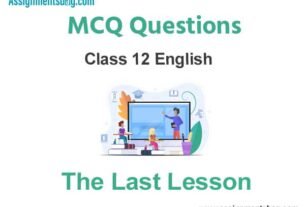Please refer to MCQ Questions Chapter 13 Mahatma Gandhi and The Nationalist Movement Class 12 History with answers provided below. These multiple-choice questions have been developed based on the latest NCERT book for class 12 History issued for the current academic year. We have provided MCQ Questions for Class 12 History for all chapters on our website. Students should learn the objective based questions for Chapter 13 Mahatma Gandhi and The Nationalist Movement in Class 12 History provided below to get more marks in exams.
Chapter 13 Mahatma Gandhi and The Nationalist Movement MCQ Questions
Please refer to the following Chapter 13 Mahatma Gandhi and The Nationalist Movement MCQ Questions Class 12 History with solutions for all important topics in the chapter.
MCQ Questions Answers for Chapter 13 Mahatma Gandhi and The Nationalist Movement Class 12 History
Question. According to Gandhi’s service of the poor is the:
(A) service of society
(B) service of humanity
(C) service of God
(D) service of disabled
Answer
C
Question. Identify the historical event shown in the picture.

(A) Quit India Movement
(B) Dandi March
(C) KhilafatMovement
(D) Non-Cooperation Movement
Answer
B
Question. Who wrote Mahatma Gandhi’s biography?
(A) C.R.Das
(B) Krishna Pillai
(C) J.M Sengupta
(D) D.G. Tendulkar
Answer
D
ASSERTION AND REASON BASED MCQs :
Question. Assertion (A) : The Congress wished to “assure the minorities in India that it will continue to protect, to the best of its ability, their citizen rights against aggression.
Reason (R) : The Congress party had never accepted the “two-nation theory”: forced against its will to accept Partition.
(A) Both A and R are true and R is the correct explanation of A.
(B) Both A and R are true but R is NOT the correct explanation of A.
(C) A is true but R is false.
(D) A is false and R is true.
Answer
A
Question. Assertion (A): Time magazine, which had once mocked Gandhiji’s physical size and seemingly non-rational ideas, now compared his martyrdom to that of Abraham Lincoln.
Reason (R): Time magazine was extremely apologetic for their comments on Gandhi.
(A) Both A and R are true and R is the correct explanation of A.
(B) Both A and R are true but R is NOT the correct explanation of A.
(C) A is true but R is false.
(D) A is false and R is true.
Answer
C
Question. Assertion (A) : The language of the letters is often shaped by the awareness that they may one day be published. Conversely, the fear that a letter may get into print often prevents people from expressing their opinion freely in personal letters.
Reason (R): Mahatma Gandhi regularly published in his journal, Harijan, letters that others wrote to him. Nehru edited a collection of letters written to him during the national movement and published A Bunch of Old Letters.
(A) Both A and R are true and R is the correct explanation of A.
(B) Both A and R are true but R is NOT the correct explanation of A.
(C) A is true but R is false.
(D) A is false and R is true.
Answer
A
CASE-BASED MCQs :
Question. Read the following excerpt carefully and answer the following questions:
On 5 April 1930, Mahatma Gandhi spoke at Dandi: When I left Sabarmati with my companions for this seaside hamlet of Dandi, I was not certain in my mind that we would be allowed to reach this place. Even while I was at Sabarmati there was a rumour that I might be arrested. I had thought that the Government might perhaps let my party come as far as Dandi, but not me certainly. If someone says that this betrays imperfect faith on my part, I shall not deny the charge. That I have reached here is in no small measure due to the power of peace and non-violence: that power is universally felt. The Government may, if it wishes, congratulate itself on acting as it has done, for it could have arrested every one of us. In saying that it did not have the courage to arrest this army of peace, we praise it. It felt ashamed to arrest such an army. He is a civilised man who feels ashamed to do anything which his neighbours would disapprove. The Government deserves to be congratulated on not arresting us, even if it desisted only from fear of world opinion. Tomorrow we shall break the
salt tax law. Whether the Government will tolerate that is a different question. It may not tolerate it, but it deserves congratulation for the patience and forbearance it has displayed in regard to this party. … What if I and all the eminent leaders in Gujarat and in the rest of the country are arrested? This movement is based on the faith that when a whole nation is roused and on the march no leader is necessary.
Question. Assertion (A): Gandhi made Salt a symbol of Protest.
Reason (R): Salt was used by Hindus and Muslims, it was used by rich and poor and the rate of tax was very high on salt.
(A) Both A and R are correct and R is the correct explanation of A.
(B) Both A and R are correct but R is not the correct explanation of A.
(C) A is incorrect but R is correct.
(D) R is incorrect but A is correct.
Answer
A
Question. Consider the following statements :
(a) Gandhi declared on 5th April that on 6th April he will break the salt law
(b) He chose 6th April, because on this day Poorna Swarajya resolution was passed.
Choose the correct option:
(A) Only (a) is correct
(B) Only (b) is correct
(C) Both (a) and (b) are correct.
(D) Neither (a) nor (b) is correct
Answer
A
Question. The Dandi March started from:
(A) Delhi
(B) Meerut
(C) Ahmadabad
(D) Bardoli
Answer
C
Question. Why was Gandhiji certain that he would not be allowed to reach Dandi?
(A) British might arrest him on the way.
(B) British might impose the Rowlatt Act on him.
(C) The British deport him back to South Africa.
(D) All of the above
Answer
A



